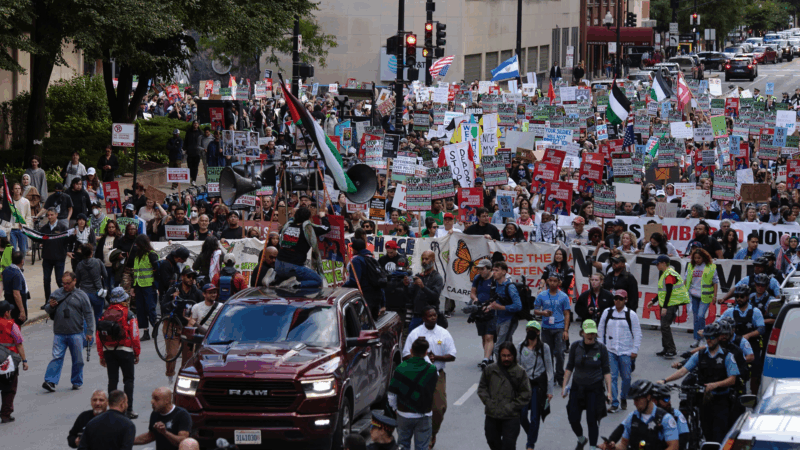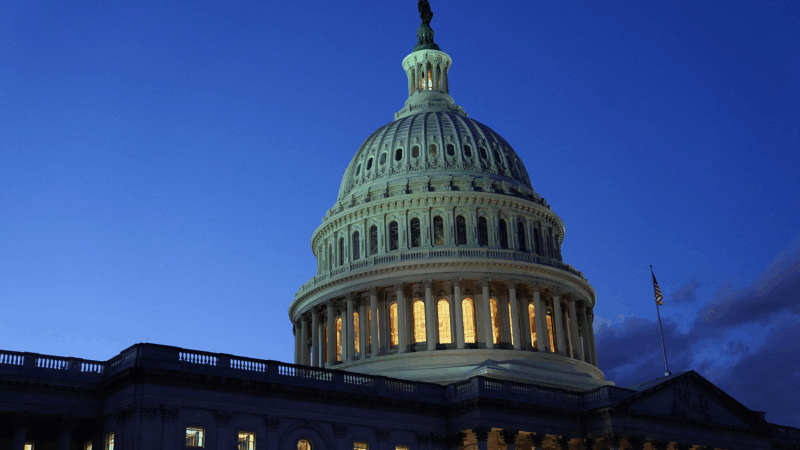Trump walks back Chicago ‘war’ threat, but vows to ‘clean up’ cities
President Trump says he doesn’t intend to “go to war” with American cities but is vowing to “clean them up” in his latest comments on an apparent plan to send National Guard troops to U.S. metropolitan areas to help fight crime or assist with deportations of suspected undocumented immigrants.
Trump was asked Sunday whether he was threatening war with Chicago following a post on his website Truth Social one day earlier.
“We’re not going to war. We’re going to clean up our cities,” Trump told reporters on Sunday as he left the White House. “We’re going to clean them up so they don’t kill five people every weekend. That’s not war, that’s common sense.”
On Saturday, Trump posted online that Chicago was “about to find out why it’s called the Department of WAR.” (Last week Trump signed an order renaming the Defense Department, though Congress would have to officially change its title.)
The social media post featured references to the 1979 Vietnam War film Apocalypse Now as well as an image of Trump made up to look like a character from the movie, Lt. Col. Bill Kilgore.
In response to the post, Illinois’ Democratic governor, JB Pritzker, wrote on X that Trump was “threatening to go to war with an American city. This is not a joke. This is not normal.” Pritzker added: “Donald Trump isn’t a strongman, he’s a scared man. Illinois won’t be intimidated by a wannabe dictator.”
Chicago Mayor Brandon Johnson, also a Democrat, said Trump’s threats were “beneath the honor of our nation, but the reality is that he wants to occupy our city and break our Constitution.”
For the past several weeks, Trump and other administration officials have suggested that Trump could send National Guard members to Chicago. Trump has claimed that Chicago needs federal help to combat crime, even though the mayor says that homicides, shootings, robberies and carjackings are all declining. Guard members may also be used to assist federal officers carrying out ramped-up deportations and immigration raids.
Trump has also threatened to send troops to Baltimore and New Orleans in recent days, cities where crime is also down. Chicago, Baltimore and New Orleans are all heavily Democratic.
Trump’s intention to send National Guard troops to American cities that didn’t request them has also faced court challenges. Last week a federal judge ruled that Trump’s use of the National Guard in Los Angeles in June was illegal and violated the Posse Comitatus Act.
In August, Trump asserted federal control over the Washington, D.C., police force and deployed the National Guard to city streets over the objections of some local leaders. Due to its unique status, the federal government has greater authority over the nation’s capital than other American cities.

In Chicago, opponents of Trump’s plan to deploy the National Guard made themselves heard over the weekend.
Marchers filled the streets of downtown Chicago Saturday evening, passing by Trump Tower and chanting slogans such as, “No hate. No fear. Immigrants are welcome here.”
Earlier in the day, organizers in the city’s Pilsen neighborhood held a parade to mark Mexican Independence Day.
Among those in attendance was Liliana Scales, who said she felt it was important for her to come out on behalf of others who are scared to leave their homes.
“We’re here. We’re not going away,” she said. “No matter what generation, no matter what threat, no matter what president is in office — we’re not going away.”
Four top U.S. speedskaters to watch at the Olympics
U.S. speed skaters set to compete in Milan are drawing comparisons to past greats like Eric Heiden, Bonnie Blair, and Apolo Ohno. Here are four to watch in the 2026 Winter Olympic Games.
5 glaring warning signs for Republicans in this year’s midterm elections
Here's why Republicans are facing an uphill battle, particularly for retaining control of the House.
A ‘Shark Tank’ alum needed cash to pay tariffs. This shadowy lending world was ready
How about $350,000 within hours? The pitches flood small businesses: "No hidden fees, No BS." These financial lifelines are barely regulated and can turn into trip wires.
U.S. skater Connor McDermott-Mostowy joins record number of out LGBTQ Winter Olympians
When U.S. speedskater Connor McDermott-Mostowy makes his Winter Olympic debut in Milan, he'll join a record number of out LGBTQ athletes. But of the 46 out athletes, only 11 are men.
Need a new path in midlife? There’s a school for that and a quiz to kickstart it
Schools across the country are offering courses and retreats for people 50+ who want to reinvent themselves and embrace lifelong learning and discovery.
Crackdown on dissent after nationwide protests in Iran widens to ensnare reformist figures
Detained Nobel Peace Prize laureate Narges Mohammadi has received another prison sentence of over seven years.







